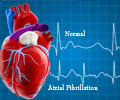Maintaining the regular rhythm of the heart with successful ablation, and not ablation itself, that may contribute to a lower risk of dementia in patients with atrial fibrillation.

- The irregular and often abnormally fast heartbeat is the most common heart rhythm problem among older adults.
- The condition increases the risk of stroke, other medical problems and death.
- Atrial fibrillation may contribute to the development of thinking problems and dementia.
- Treatments include digoxin and beta-blockers, cardioversion (a controlled electric shock to restore the normal rhythm), or catheter ablation.
- Catheter ablation involves inserting a tube through a blood vessel to the heart to identify where the arrhythmia originates.
‘Catheter ablation reduced the incidence of dementia by nearly a third (27%) in atrial fibrillation patients compared to those who tried to control their condition with medication alone during the follow-up period. ’





There were 164 dementia cases in people who had ablation, and 308 cases in the medical therapy group. Prof. Joung said: "The proportion of people who developed dementia during the follow-up period was 6.1% in the ablation group and 9.1% in the medical therapy group. This suggests that three people per 100 of the atrial fibrillation population avoid dementia if they undergo catheter ablation, and 34 patients would need to be treated to prevent one case of dementia during the follow-up period."
Catheter ablation was linked to a
- 23% lower incidence of Alzheimer's disease compared to medical therapies.
- 50% decrease in vascular dementia.
- Ablation was significantly linked to a reduced risk of overall dementia and vascular dementia.
First author of the study, Dr. Daehoon Kim, a fellow of cardiology at Yonsei University College of Medicine, said: "Due to the observational nature of the study, our findings show only an association between ablation and dementia. To answer the question whether ablation for atrial fibrillation reduces the incidence of dementia, a randomised controlled trial investigating cognitive outcomes is needed. However, we believe the finding that only successful ablation is associated with lower dementia risk is important because it suggests there might be a dose-response relationship between ablation maintaining a regular heart rhythm and a lower risk. We are going to investigate whether a rhythm control strategy for atrial fibrillation is associated with a lower risk of dementia, compared with a strategy to control the rate of the heartbeat."
Source-Medindia













